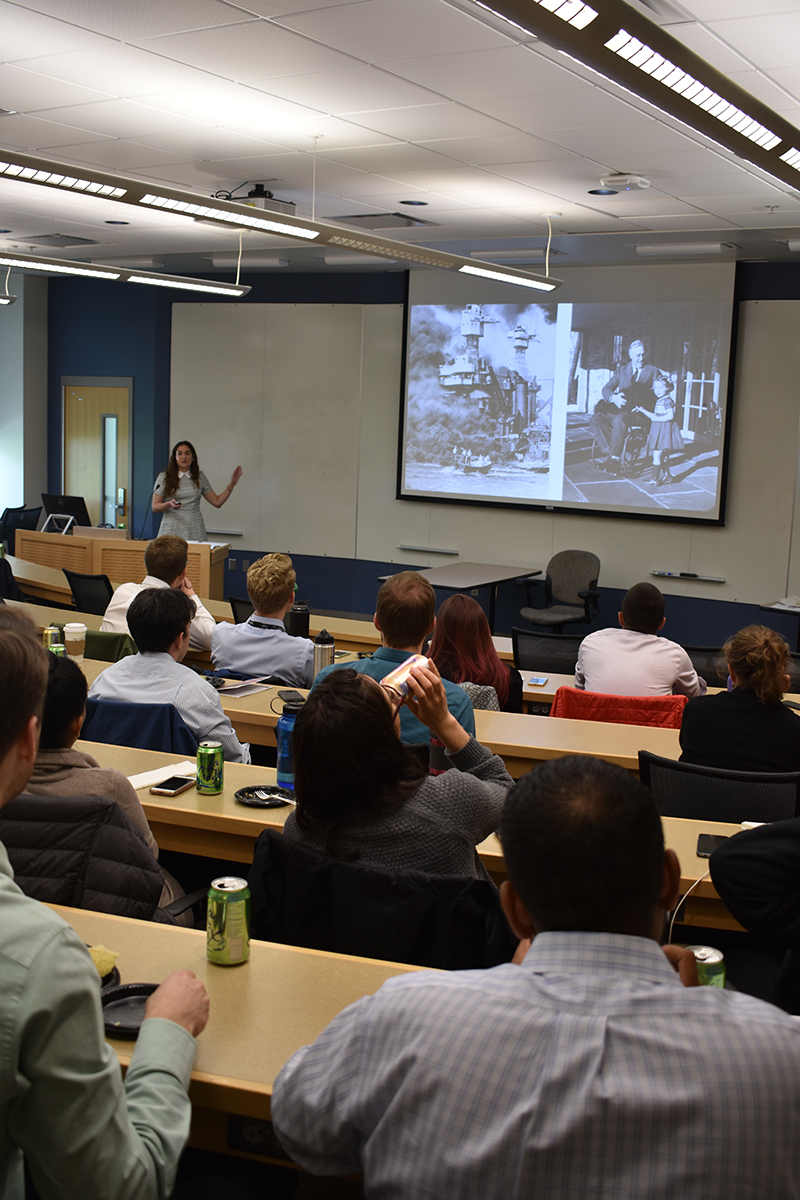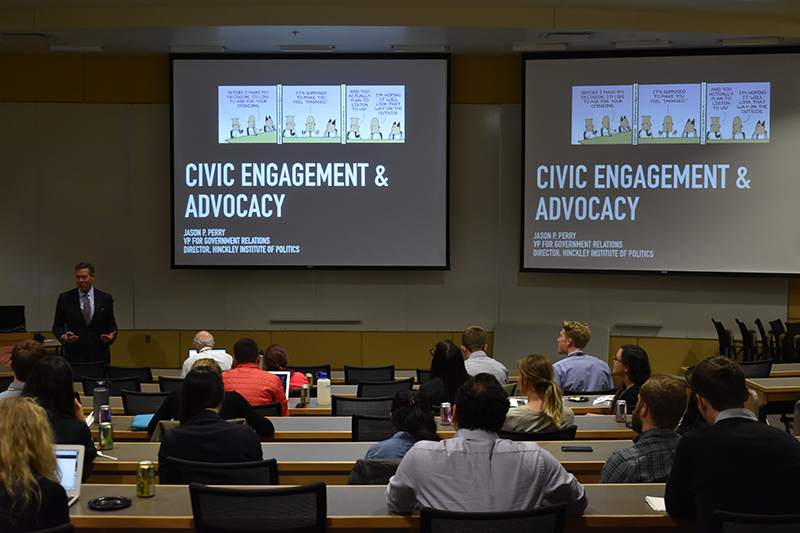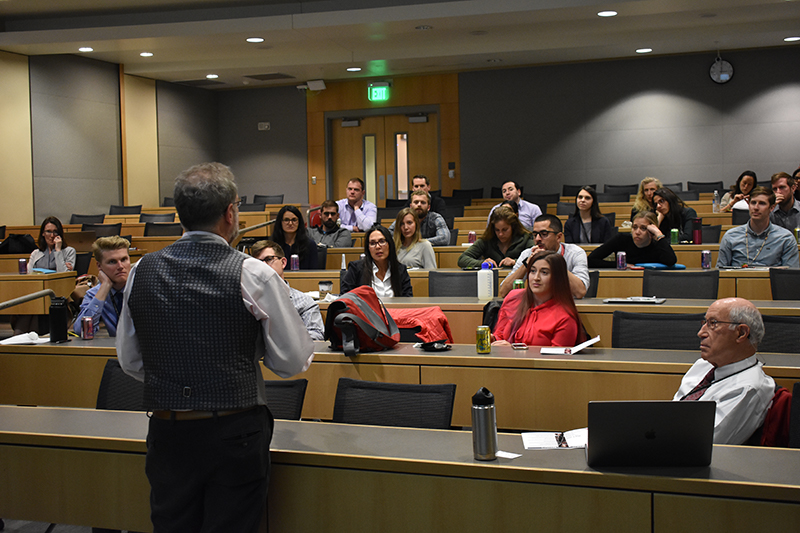Inaugural Healthcare Policy Seminar Strives to Create Well-Rounded Physicians
The Department of Internal Medicine Residency Program held its inaugural Healthcare Policy Seminar on May 8 and May 9, 2019 to an audience of over forty trainees and faculty members. This two-day seminar brought together local and national healthcare policy experts and analysts to present on legislative processes and history, healthcare economics, and healthcare advocacy.
 Speakers included Laura Summers, a Senior Health Analyst from the Kem C. Gardner Policy Institute; Norman Waitzman, professor and chair of Economics at the University of Utah; Hailey Ritchie, associate general counsel at the University of Utah; Jason Perry, Vice President of Government Relations and Director of the Hinckley Institute; and Jordan Warchol, an assistant professor in the Department of Emergency Medicine at University of Nebraska Medical Center.
Speakers included Laura Summers, a Senior Health Analyst from the Kem C. Gardner Policy Institute; Norman Waitzman, professor and chair of Economics at the University of Utah; Hailey Ritchie, associate general counsel at the University of Utah; Jason Perry, Vice President of Government Relations and Director of the Hinckley Institute; and Jordan Warchol, an assistant professor in the Department of Emergency Medicine at University of Nebraska Medical Center.
A charged political atmosphere, at both the local and national level, sparked the idea behind this year’s event. “Our political atmosphere has become so polarizing,” says Emily Signor, Chief Medicine Resident and seminar organizer. “Decisions on important policies can be made without stakeholders – in our case, the physicians,-who ultimately have little voice in decisions that impact them and their patients. One goal of this event was to show that we as physicians can make a difference by advocating change and educating our peers.”
The primary objective of the seminar was to provide education and information to create more informed physicians. “Physicians must not only must possess clinical skills, but they must have an understanding of health policy and the economics of healthcare to work effectively in healthcare systems” says Caroline Milne, Vice Chair for Education and Director of the Internal Medicine Residency Program. Residents were introduced residents to topics outside the traditional internal medicine curriculum, with several goals in mind including understanding how healthcare in our country works.
Building on these basics, attendees were introduced to how physicians can influence patients’ health in ways that don’t include diagnosis and treatment. “Dr. Signor and I wanted to get our doctors to think about what our responsibility is for our patients outside the hospital and clinic,” Milne adds. “Those issues include-but aren’t limited to- access to and affordability of healthcare and environmental issues and laws that impact health. The basis of this entire curriculum is to return us to our professional roots and values. We went into this profession to relieve suffering of the patient. The patient is the primary focus and healthcare advocacy brings you back to that focus.”
While creating a well-rounded physician was the cornerstone of this year’s event, the seminar was also intended as a means to battle resident burnout. Signor believes that residents feel dejected when they have no control on how healthcare is implemented in practice. “Some patients have insurance issues directly dictated by policies put in place by lawmakers who don’t understand their unique health circumstances,” she says. “When residents are aware they have agency to change imperfections in the system, they may have a better overall sense of wellness.”
Even seasoned physicians, Signor says, need to be knowledgeable about healthcare policy basics to advocate for patients and perhaps battle burnout. In attendance at this year’s event were faculty members seeking a healthcare policy refresher crash course; among them was Rachel Kroencke, an assistant professor in the Division of General Internal Medicine. “When I was in medical school, there might have been a few informal presentations on healthcare policy, but not enough,” she admits. “This seminar included basics that I definitely wanted to relearn, but I was surprised of how much I didn’t know. Understanding even the basics of healthcare policy can be so useful in addressing an issue in clinic by addressing the policy behind it.”
 Though not an obvious area of medical training, and often shared in small pieces on rounds, helping residents and faculty to focus on these topics raises the level of emphasis and importance. “We understand that learning about policy and advocacy isn’t usually something expected of one’s residency education, or even as a part of continuing medical education,” adds Signor, “but healthcare culture and the emotional atmosphere of politics are changing what kind of knowledge is expected of modern physicians. If you don’t know how and why the system works, how can you ever change it?”
Though not an obvious area of medical training, and often shared in small pieces on rounds, helping residents and faculty to focus on these topics raises the level of emphasis and importance. “We understand that learning about policy and advocacy isn’t usually something expected of one’s residency education, or even as a part of continuing medical education,” adds Signor, “but healthcare culture and the emotional atmosphere of politics are changing what kind of knowledge is expected of modern physicians. If you don’t know how and why the system works, how can you ever change it?”